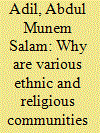| Srl | Item |
| 1 |
ID:
087032


|
|
|
|
|
| Publication |
2009.
|
| Summary/Abstract |
The code of citizenship marks out the "other," continually reproducing and re-inscribing it through legal and judicial pronouncement in a relationship of contradictory cohabitation. The relationship is, however, not one of exclusion or simple opposition, but rather that of forclusion, where the outsider is present discursively and constitutively in delineations of citizenship. This article examines the manner in which the process of forclusion unfolded in the delineation of citizenship in Assam, in northeastern India, in particular in the contests around the Illegal Migrants Determination by Tribunal Act [IMDT] of 1983, and the complex reconfiguration of political forces and power relations between the Center and the state of Assam on the question of definition and identification of illegal migrants. The authors examine the contests over the IMDT Act, in the context of the elections in Assam in 1983, the Assam Accord of 1985, and the Supreme Court Judgment in August 2005 striking it down. They show how the illegality/alien-ness of the migrant became central to the construction of the Assamese identity in the 1980s and how the illegal migrant and the IMDT Act figured in precarious relationships of consensus and antagonism depending on the nature of political/electoral contests between the Center and state governments.
|
|
|
|
|
|
|
|
|
|
|
|
|
|
|
|
| 2 |
ID:
133418


|
|
|
|
|
| Publication |
2014.
|
| Summary/Abstract |
At the end of the Second World War, British intelligence struggled to enforce strict limits imposed on Jewish immigration to Palestine. Holocaust survivors and Jews wishing to escape communism in Eastern Europe flooded the western Zones of occupation in Germany and Austria, while the Zionist movement worked to bring them to Palestine. Illegal immigration to Palestine was the key policy dispute between Britain and the Zionist movement, and a focus for British intelligence. Britain sought both overt and covert means to prevent the boarding of ships at European ports which were destined for Palestine, and even to prevent the entry of Jewish refugees into the American zones. This article highlights Britain's secret intelligence-gathering efforts as well as its covert action aimed to prevent this movement. It highlights a peculiar episode in the 'special relationship' between Britain and the United States, during which cooperation and partnership was lacking. British intelligence promoted a rumour that Soviet agents were using Jewish escape lines to penetrate Western Europe and the Middle East in order to persuade American authorities to prevent the movement of Jewish refugees. Instead, this article argues, American intelligence secretly cooperated with the Zionist organizers of the escape routes so to expose Soviet agents. Britain's attempt at deception backfired, and provided effective cover for the movement of hundreds of thousands of Jews during a critical period. Meanwhile its intelligence had dramatically improved, but policymakers failed to reassess Britain's ability to sustain immigration restrictions and the indefinite detention of tens of thousands of illegal migrants.
|
|
|
|
|
|
|
|
|
|
|
|
|
|
|
|
| 3 |
ID:
130902


|
|
|
|
|
| Publication |
2014.
|
| Summary/Abstract |
I'm not going to cite precise figures and pass judgments or use demographic jargon. I think it is necessary to shed light on the phenomenon of massive migration to Europe from countries of the Middle East and North Africa that experienced the so-called Arab Spring and on possible ramifications for Russia in terms of economic and cultural adaptation of a fraction of these migrants from Europe to Russia already saddled with a colossal problem of illegal migrants.
|
|
|
|
|
|
|
|
|
|
|
|
|
|
|
|